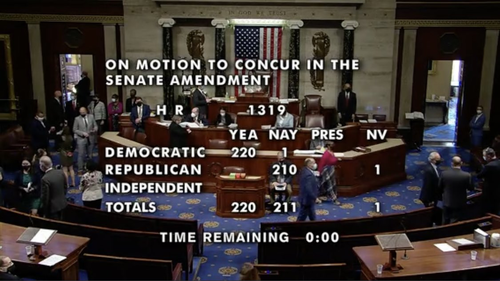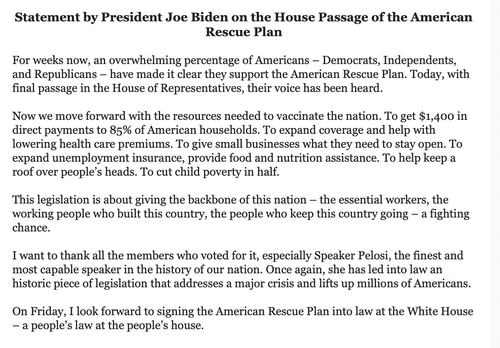
The House on Wednesday passed the $1.9 trillion stimulus package following modifications made by the Senate to their original bill. It now heads to President Biden’s desk, where he is expected to sign it on Friday according to White House spokeswoman Jen Psaki.
No Republicans voted for the stimulus.
In a Wednesday afternoon statement, President Biden – or whoever wrote it – said: “Now we move forward” with the legislation, which includes $1,400 for eligible residents in lieu of the long-promised $2,000 payments. The statement confirms a Friday signature.

The stimulus is expected to be signed into law before various federal benefits expire on March 14, after which $1,400 checks can begin flowing within one to two weeks based on the timeline for the previous round of checks, and Tuesday comments by Senate majority leader Chuck Schumer (D-NY), who said at a Buffalo, New York press conference that families could expect to receive checks in about two weeks.
“By next weekend, a couple making less than $160,000 could well have $2,800 deposited into their checking account,” said Chris Krueger of Cowen & Co. before the Senate approved the bill, according to CBS News. That said, fewer Americans are likely to receive checks in this third round of stimulus due to changes made by the Senate, after a deal was struck with the Biden administration to narrow the qualifications for $1,400 payments.
Individuals earning up to $75,000 will be eligible for the full $1,400, while those earning $80,000 or more won’t qualify. For couples filing jointly, the phase-out begins at $150,000 and ends at $160,000. Heads of household must earn $112,500 or less to qualify, and are disqualified after $120,000 of income.
CBS News suggests using this Omni online calculator to determine whether you qualify based on your most recent tax return.
The spending bill will also include an extension of weekly unemployment benefits, though reduced from $400 per week to $300. The Child Tax Credit for low-income households will also be expanded.
“Working families will get $1,400 per individual from a third stimulus check, plus they will benefit from a muscled-up child tax credit of $3,000 per child,” according to unemployment expert Andrew Stettner of the Century Foundation.
Also included in the bill is funding for states and cities, as well as small businesses and schools. Government spending on COVID-19 testing and contact tracing will also receive a boost.
As for the anticipated effects on equities, according to DB’s Jim Reid which we noted last week;
“It’s worth highlighting that a large amount of the upcoming US stimulus checks will probably find their way into equities,” said Reid, who then noted that a late-February survey by DB’s chief equity strategist Binky Chadha suggested that online account brokerage users would invest approximately 37% of future stimulus checks in the stock market.
So here is Reid’s math: “Given stimulus checks are currently penciled in at c.$405bn in Biden’s plan, that gives us a maximum of around $150bn that could go into US equities based on our survey. Obviously only a proportion of recipients have trading accounts, though. If we estimate this at around 20% (based on some historical assumptions), that would still provide around c.$30bn of firepower – and that’s before we talk about any possible boosts to 401k plans outside of trading accounts.”
⚠️BREAKING:
*HOUSE PASSES $1.9 TRILLION STIMULUS BILL, PRESIDENT BIDEN SET TO SIGN IT BY END OF WEEK pic.twitter.com/Mwf5JQ44Kv
— Investing.com (@Investingcom) March 10, 2021
Via Zero Hedge


